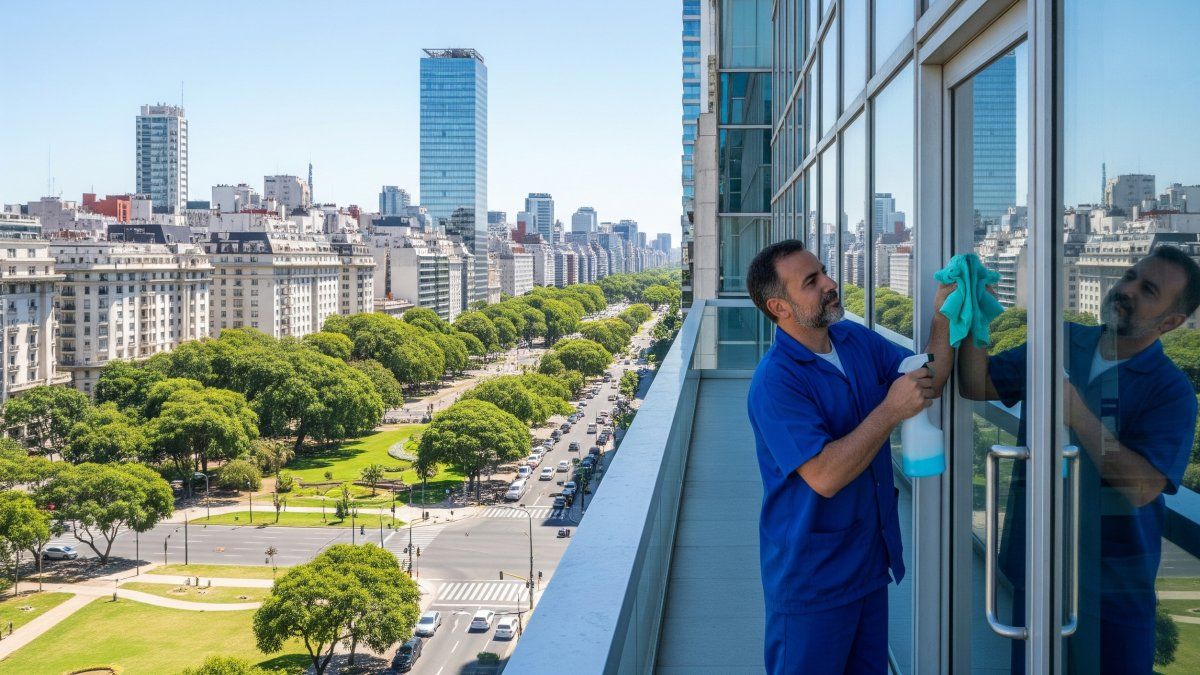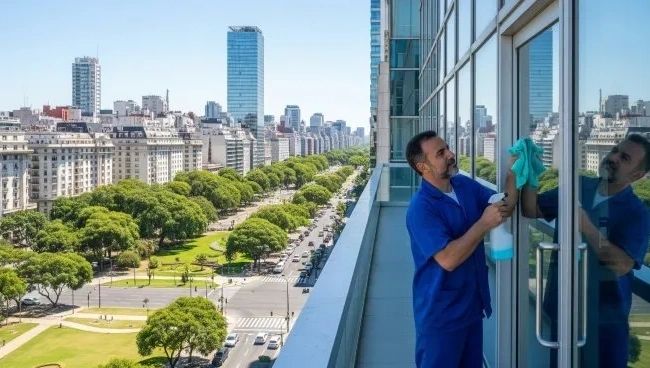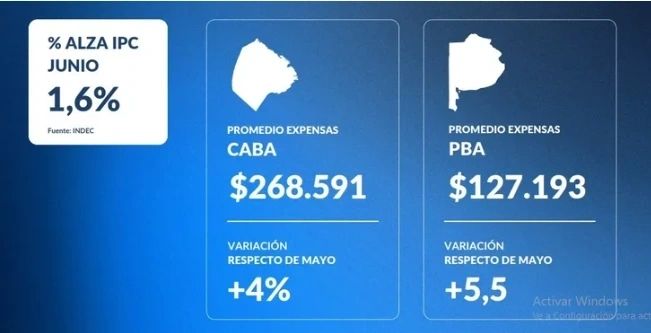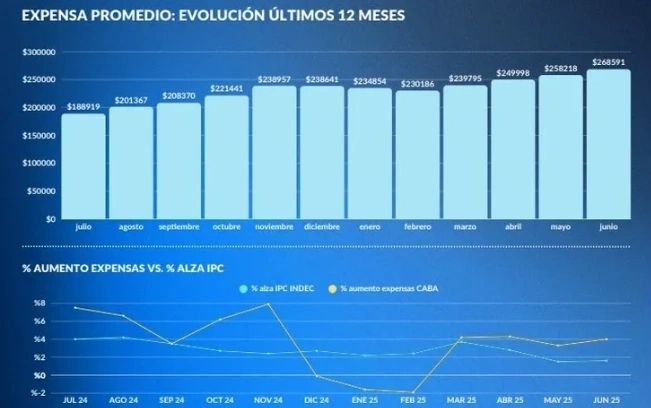BuySellBA
Administrator
Expenses rose 4% in June: although they outpace inflation and remain a high cost, are they slowing down? - Ámbito Financiero

Source;

Expensas subieron 4% en junio: aunque superan la inflación y siguen como gasto alto, ¿se desaceleran?
Acumulan un 52,8% interanual en CABA. Qué tener en cuenta para reducir costos en un contexto de aumentos constantes y gastos obligatorios.
July 17, 2025
They've accumulated a 52.8% year-over-year increase in Buenos Aires City. What to consider when reducing costs in a context of constant increases and mandatory expenses.
By José Luis Cieri

A building manager performs cleaning tasks in a building in the City of Buenos Aires. The expenses cover essential services for the maintenance of the condominiums.
In June, average expenses in the City of Buenos Aires reached $268,591, a 4% increase compared to May, when they averaged $258,218. The year-over-year increase is 52.8%, as in June of last year the average was $175,727. The data comes from a survey by ConsorcioAbierto.com of 12,000 consortia that use its platform in the City and several provinces.
The monthly increase occurred amid more subdued overall inflation. According to INDEC (National Institute of Statistics and Census), the Consumer Price Index (CPI) grew 1.6% in June, with a year-over-year increase of 39.4%. Housing , water, electricity, and other fuels increased 3.4%, driven by increases in rent and basic services.
With general inflation remaining below 2% monthly for the last two months, a slowdown in the rate of adjustment of expenses is beginning to consolidate, as until the beginning of the year they registered increases exceeding 100% year-on-year. Although they continue to represent a high expense—in some cases more than half of a monthly rent—the expectation in the sector is that, if inflation remains at these lower levels, expense increases will begin to fall below this rate in the coming months.
The study also collected data from other provinces. In Buenos Aires, expenses averaged $127,193 in June, a 5.5% monthly increase and an 83% year-over-year increase. In Córdoba, they reached $119,106, a 74.7% year-over-year increase and a 2.5% monthly increase.

Source: Consorcio Abierto
In Santa Fe, prices averaged $107,014, 74.1% more than a year ago, but down 1% monthly. In Entre Ríos, prices stood at $51,078, up 62% year-over-year and down 8.5% monthly.
Impact of late payments
The report also addressed the delinquency situation, which remains stable. According to ConsorcioAbierto, 17% of functional units in Buenos Aires City and the province of Buenos Aires have debt. In other words, 17 out of every 100 departments owe expenses, a proportion that remained stable throughout 2024 and continues into 2025.
Albano Laiuppa , director of the platform, explained that while the number of delinquent units tends to remain stable, the amount of debt is growing due to the accumulated effect of interest. According to the survey, the average interest rate in Buenos Aires City was 5%, while in the province of Buenos Aires it reached 6.4%.
The difficulty in keeping up with utility bill payments has become one of the most significant problems for condominiums in Buenos Aires and the surrounding metropolitan area. Although the percentage of owners with debt has not shown a marked increase in the last year, the impact on community accounts and the upkeep of buildings is becoming increasingly noticeable. Administrations and residents face increasing pressure to provide essential services and prevent the deterioration of facilities.
The average delinquency rate is around 25%, according to industry estimates (not included in the report), a proportion that remained stable despite a slowdown in the rate of rising utility bills. The impact of these costs on household income is significant, especially for tenants in buildings with central services or amenities, where the proportion of their monthly budget allocated to utilities can reach 50% (three- or four-room units cost $700,000 a month and $350,000 in utilities are common today).
What explains the increases
Rodrigo Martínez Daveño , a lawyer and property manager, analyzed the reasons behind the increases. He emphasized that the salaries of property managers, after being delayed in 2023 and early 2024, have recovered to historic levels through new collective bargaining agreements. Furthermore, many property companies had to face deferred payments and moratoriums assumed during the inflationary crisis of the summer of 2023/2024, the balances of which impacted throughout 2024 and early 2025.
The specialist indicated that during the peak inflation period, maintenance work, such as exterior painting or elevator repairs, was suspended or postponed, and can no longer be postponed for reasons of safety and preserving property values. These projects generate new costs that are difficult to avoid today.
Martínez Daveño explained that the combination of high utility rates, updated salaries, and postponed maintenance led to higher spending levels. "In past years, these increases occurred alternately, but now they have been combined," he emphasized.
Tips to contain expenses
The administrator suggested that consortium members and owners conduct a thorough review of their current expenses and negotiate better terms with suppliers. He proposed exploring alternatives such as choosing banks with lower fees for the consortium's accounts, replacing top-brand cleaning products with generic ones, or reducing electricity consumption with timers.
He also recommended evaluating the number of staff and contracted services. "Perhaps reducing staff hours, both security and security, could be the most significant savings option," he explained. In small buildings, he suggested the possibility of eliminating a full-time security guard to prevent that cost from limiting other necessary investments.

Source: ConsorcioAbierto, value evolution in CABA
Martínez Daveño pointed out concrete examples of savings: cutting $50,000 a month with general cleaning, reducing $40,000 with better use of electricity, and achieving savings of up to $200,000 in winter by reducing heating hours with a boiler. He also pointed to the possibility of replacing private security with electronic totems, which entail much lower costs.
The administration's view
Laiuppa emphasized the importance of transparency and shared information. “Managing a building means responding quickly to an increasingly demanding cost environment. Technology allows all residents to access the same information in real time, fosters transparency, and facilitates shared decision-making to better manage resources,” he explained.
For Laiuppa, the close of the first half of the year offers an opportunity for consortia and residents to carefully review their accounts. He concluded: “It's a good time to ask ourselves where each peso of expenses goes. In a context of constant increases and expenses that cannot be postponed, consortia need to talk, review priorities, and have clear information to make decisions together.”
www.buysellba.com

